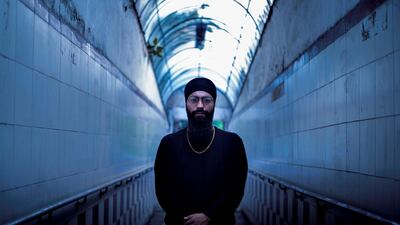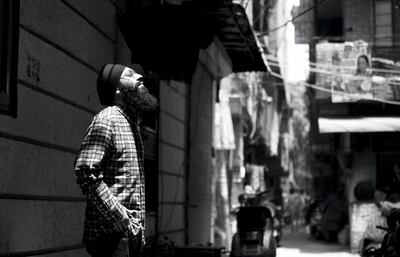A quarter of the way into Class-Sikh, the debut album by New Delhi rapper Prabh Deep, the music gives way to the ringing of a telephone. "Yaar, Abu dead ho gaya hai yaar, (Dude, Abu is dead)," says the voice on the other end. "Overdose." During the next minute, Prabh narrates the story of his childhood friend's descent into drug addiction and crime. With unflinching honesty, he talks about Abu's murder convictions, his multiple stints in prison and Prabh's hope that he would turn over a new leaf after his wedding, a hope that would be dashed by that fateful phone call.
It is a masterful bit of spoken-word poetry, made even more effective by Prabh’s refusal to romanticise or make excuses for the rage that drove his friend into an early grave.
For most rappers, this sort of proximity to violence and organised crime would be a badge of honour, the perfect story to establish their credentials as a bona fide street anti-hero. But in Prabh's hands, it is transformed into a searing indictment – of his friend's string of bad decisions; of the toxic culture of hyper-masculinity and conspicuous consumption that enabled those decisions; and of a society that looks the other way as poverty and addiction devour its young. Abu is a rare moment of vulnerability on a record that is otherwise bursting at the seams with swagger and aggression, and it is all the more powerful for it.
For all of Prabh's considerable skills on the mic, it is stories like this one – and the compassionate but unsentimental way in which he offers them up – that make Class-Sikh the best Indian hip-hop record of the past few years.
For the longest time, when people spoke of Indian hip-hop, what they actually meant has the novelty cringe-rap of Baba Sehgal – India's very own Vanilla Ice – or the half-cooked rhymes that music producers stuck in the middle of Bollywood film songs in ill-fated attempts to make the music more hip and contemporary.
Then, at the turn of the decade, Punjabi rappers such as Yo Yo Honey Singh and Badshah broke into the mainstream with their sanitised, ultra-materialistic take on party rap, quickly becoming the go-to hitmakers for Bollywood. But all this while, as I noted in a piece for The National earlier this year, there was another hip-hop revolution brewing in the shadows.
This underground rap movement takes its cues from rap’s more rabble-rousing and socially conscious origins – the conscious rap of KRS One and Talib Kweli, the insurrectionary hip-hop of Public Enemy and NWA, and more recently, Kendrick Lamar’s thoughtful meditations on life in inner-city America. The current poster-boys of this movement are Mumbai gully (street) rappers Divine and Naezy, who have found mainstream success by making class-conscious, politically aware music that chronicles the lived experiences of Mumbai’s disaffected working-class youth.
Now Prabh – at 23, already a highly respected veteran of the New Delhi rap scene – is gunning for their crowns. Rapping in slang-inflected Punjabi, with a smattering of Hindi and English thrown in, the b-boy turned rapper has built a loyal fan following on the back of his rhythmic flexibility and tonal dynamism.
In a scene full of one-note rappers, Prabh is a chameleon. One minute he is an old-school conscious rapper handing out little pearls of street wisdom in a languid, mellifluous drawl. The next, he is a snarling rap juggernaut, spitting out relentless rhymes in a voice that sounds like he has been gargling with broken glass.
But it is Prabh's skill as a story-teller that really sets him apart from his peers. On the largely autobiographical Class-Sikh, aided by the considerable production skills of regular collaborator Sez, he documents life in the dingy back-alleys of West Delhi's lower-income neighbourhood of Tilak Nagar in gritty social realist detail.
His eye for the profound in the quotidian transforms everyday stories of violence and poverty into incandescent anthems about surviving against the odds. His vocal versatility allows him to don multiple personas as he weaves a classic coming-of-age story – the desperate young boy figuring out how to fit in, the hardened teenager coming to terms with loss and mortality, and finally the triumphant young rapper on the cusp of greatness.
And through it all Tilak Nagar, home to successive waves of refugees – from the Partition, from the 1984 anti-Sikh riots, and even from the ongoing civil war in Afghanistan – acts almost as a second protagonist, Prabh’s love for his locality bleeding through even as he casts a critical eye on the social ills that plague it.
Class-Sikh can roughly be divided into two halves. In the first, Prabh looks back at his childhood and young adulthood, growing up in poverty as the child of Sikh refugees who lost everything in the 1984 riots. Over the serpentine synths of lead single Suno, he takes the Indian education system to task for failing children from lower-income backgrounds, a failure that he links directly to the rise in adolescent drug use and crime.
The drug epidemic that holds Tilak Nagar in its grip also features heavily on Click Clack. Over gloomy synths and minimal, skittering percussion, Prabh paints a grim portrait of the damage drugs have done to his friends and his neighbourhood. He is eviscerating yet empathetic, offering up these stories as a warning rather than sitting in judgement.
____________________
Read more:
Swet Shop Boys ‘Cashmere’ – a blend of South Asian samples, London slang and US hip hop
Soundcheck: Indian rapper Hard Kaur on her new single Sherni
Straight outta Karachi: Urdu duo Young Stunners are back to revitalise Pakistan’s rap scene
____________________
Up next is the two-track suite that forms the centrepiece of the record – Kal (Yesterday) and Future (which, in Hindi, is also "Kal"). The former is a melancholic account of a fight with neighbourhood bullies, encoded with the anxieties of everyday violence and a precarious existence. But things start looking up on Future, a brighter, uplifting ode to Prabh's faith in music as a vehicle for personal and social advancement.
The rest of the record deals with Prabh's journey as an ascendant young rapper. Album highlight G Maane is a grimy, low-end-heavy banger that is part mission statement, part music industry derision. And just when it seems that the weight of the conceptual subject matter will drag the record down, in comes Murder. Over its retro Bollywood samples and high-tempo percussion, Prabh goes all in, treating us to an exhilarating, over-the-top display of virtuosity.
Since its October release, Class-Sikh has pushed Prabh into the national limelight. He has toured across the country, opening for British rapper Lady Leshurr, and BBC Asian Network DJ Bobby Friction picked Suno as his show's track of the week. He has also signed his first endorsement deal, with sports apparel brand Puma. But Prabh is far from satisfied with such small achievements.
When I interviewed him a couple of months ago for GQ India, he told me, with the same outsized self-confidence that drives his music, that one day he was going to play Madison Square Gardens. If it was anyone else, I would dismiss that as outlandish fantasy. But Prabh has the talent and the ambition to make it happen.
“It’s all about the throne, man,” he told me with a twinkle in his eye. “I’m going to snatch that throne away from Divine. Because I know I’m better than him.”


